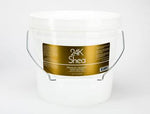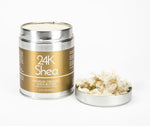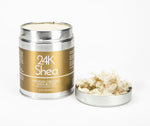When you hear the words shea butter, what instantly comes to your mind? Skin care? Body butter? Africa? Forests? Probably not forests. Well, they should! Why? Aside from the fact that Shea butter actually comes from trees, buying Shea butter helps to maintain and protect the eco system it’s apart of- and that includes forests. How many skin care ingredients can you say that about? Not a whole lot. But with Shea butter, you can. Here’s why:
Shea butter comes from Shea nuts that grow on the Shea, or Karite, tree. While many plants used for the skin care market place are cultivated, Shea butter can be very easily and responsibly wild crafted because the trees are already a part of Africa’s natural and wild eco system. And like every tree, they help to prevent soil erosion, provide homes and food for animals and other critters, as well as providing a valuable community resource for the people who live there.
Additionally, Shea butter is traditionally viewed as a food item in Africa since it’s used often as a cooking oil. Traditionally, food items are seen as being under the jurisdiction of women, and since Shea butter is considered to be a food item it automatically falls under the umbrella of resources available to women. Additionally, Shea trees are viewed as a community resource that cannot and should not be owned or exploited, which basically ensures their survival and thus the survival of all the life their existence in turn supports. Because of this, we are able to source wild harvested Shea butter from Shea trees that support their native ecosystem to flourish.
In terms of wild harvested versus organic Shea butter, because Shea butter grows so abundantly and naturally, the difference between the two terms can become a little blurred. You can err on the side of safety and go with wild crafted Shea butter because wild grown Shea is automatically “organic”, even if it isn’t cultivated and certified. This is one of the really great things about Shea butter: it actually surpasses organic by being wild, and in the process supports the integrity of its natural ecosystem, along with the women who harvest it for use on your skin, not to mention all the other traditional uses it has in Africa.
Now, every time you apply some raw African Shea butter, you’ll know that you’re not only supporting the health and integrity of your skin, but of big forests and the communities that rely on them.



